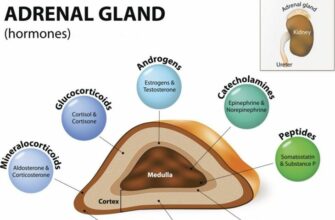Most of us know that in order to live a happy, healthy life, we need to take care of our heart. While all our organs are important, the heart is what keeps us alive. It pumps blood and oxygen through the body, providing us with a pulse. Without one, we can’t survive. Heart disease is a group of conditions relating to the heart, such as cardiomyopathy, atrial fibrillation, and heart failure.
We assume that if we don’t smoke, drink excessively, exercise regularly and eat healthy that we won’t get heart disease. Unfortunately, that’s not true. There are many risk factors for heart disease, and some of them are just downright strange! Thankfully, we can change some of them, but there are others we can’t. Here are 18 of the oddest risk factors for heart disease…
Troubled Childhood
The trauma a person experiences as a child follows them into adulthood. It changes so much about a person, their personality, their outlook on life, their mental health, and can even increase their risk of heart disease. According to WebMD, violence, bullying, and abuse in childhood (including seeing harm done to others), has been linked to high blood pressure, obesity, and type 2 diabetes in adults. All of these health conditions increase a persons likelihood of heart disease.
The reason adults with this kind of history in their childhood are more likely to have these conditions is because of all the stress it puts on their body — physically and mentally. This type of intense stress can change how the body works, says WebMD. They may also be dealing with the stress of feeling unsafe as a child in unhealthy ways as an adult.
Where You Live
Prevention cites a 2016 study published by the American Heart Association which looked at heart disease in terms of location. The study found that countries with the highest rate of fatality due to heart disease were located in the South. “Your environment is important. It dictates your ability to access fresh fruits and vegetables and safe places to bike and walk and even the air you breathe,” says Garth Graham, MD, MPH, cardiologist and president of the Aetna Foundation when talking to Prevention. All of these factors play a role in heart health.
There is also evidence to suggest that altitude can increase a persons risk for heart disease. A study published in the journal Frontier in Physiology found that “people living at higher altitudes (between 457 and 2,297 meters) had a lower risk of developing metabolic syndrome — a cluster of heart-disease risk factors like high blood pressure, high cholesterol, and obesity — than those who lived at sea level,” writes Health.com.
Forehead Wrinkles
Wrinkles is something none of us can escape. They’ll catch up to us at some point as we age, but according to Health.com who cites research from the 2018 annual conference of the European Society of Cardiology, deep forehead wrinkles could be an indicator of heart disease. It’s important to note, this is mainly for people who have deep lines across their forehead, more so than what’s typical for their age.
“You can’t see or feel risk factors like high cholesterol or hypertension,” says study author Yolande Esquirol, associate professor of occupational health at the Centre Hospitalier de Toulouse in France in a statement. “We explored forehead wrinkles as a marker because it’s so simple and visual. Just looking at a person’s face could sound an alarm, then we could give advice to lower risk.”
Pregnancy Complications
Pregnancy is not easy. Carrying a baby for 9 months, then going through a deliver is hard on a woman’s body. Now there’s research indicating it could have an effect on women’s heart health down the line. Studies show women who had complications during pregnancy such as gestational hypertension, preeclampsia, eclampsia, spontaneous preterm delivery, and gestational diabetes, are at a heightened risk for cardiovascular disease, says Prevention.
It’s unclear why this is, but anyone who’s had one of these complications during a pregnancy should talk to their doctor about getting regularly screened for diabetes and hypertension.
Delivering a Premie
Similar to complications during a pregnancy, a study published in Circulation found that if a woman goes into labor early and delivers a premature baby (before 37 weeks gestation), her risk for cardiovascular disease increases by 40-percent. This is in comparison to women who’ve had full-term pregnancies. The earlier the delivery, the greater the risk. Health.com warns that women who delivered their baby before 32-weeks had double the risk of those who’d gone full-term.
It’s important to note that the authors of this study do state premature delivery isn’t a cause for heart disease. However, it can play a role in prediction. It can be a useful tool in identifying young women who are at risk for heart problems later in life, says Health.com.
Depression
We all get sad from time to time, but depression is a much more severe state of sadness that effects all aspects of daily life. Not only does it take a toll on mental health, but it can trickle into a person’s physical health as well. According to Prevention who talked to Jackie Eubany, MD, a cardiologist at Placentia-Linda Hospital in California, studies have shown that people who are diagnosed with depression are at a higher risk for cardiovascular disease.
“It’s not 100-percent certain why this happens, but it’s thought to be because you’re less likely to take care of yourself like eat well and exercise, especially if you already have high blood pressure or other health issues,” says Dr. Eubany to Prevention. Experts have also noticed that people with depression don’t recover as well from heart attacks or other heart-related problems.
A Recent Breakup
When we hear of something truly sad we refer to it as “heartbreaking,” and there’s a reason for that! Emotional distress can actually cause heart problems, says Women’s Health. In fact, it even has a name: broken heart syndrome.
“This one is hard to prevent or avoid as any deeply upsetting event can cause it, including a breakup, loss of loved one, financial distress, a move, or a divorce,” says Adam Splaver, MD, a cardiologist at Nanohealth Associates in Hollywood, Florida to the source. While we can’t avoid heartbreak or emotional distress, Splaver tells Women’s Health we can control how we deal with these feelings. Some healthy coping techniques would be exercise, meditation, yoga, or therapy.
Being a Parent and Age of Menstruation
Being a parent is one of the most rewarding experiences of all time, but unfortunately it can also increase a persons risk for heart disease. According to WebMD, parents have a higher chance of getting heart disease and this only increases with each child. Biology doesn’t seem to be the reason behind it as the risks are equal for both males and females.
Similarly, women who get their first period before turning 12 or stop having their period before the age of 47 are more likely to have a stroke or heart disease, notes the source. This risk increases if a woman had a miscarriage or their ovaries or uterus removed.
You’re Being Treated for ADHD
People with attention-deficit/hyperactivity disorder (ADHD) have a slightly higher risk of heart disease than people who don’t thanks to their medication. Stimulant drugs like dextroamphetamine and methylphenidate work wonders to help people with ADHD focus, but they also raise blood pressure and heart rate.
While this isn’t a significant issue, WebMD warns that over time it can lead to heart problems. If you’re taking these medications to treat ADHD, talk to your doctor to make sure the benefits outweigh the potential risks to your heart.
You’re Lonely
Nobody likes being lonely. It obviously has a major effect on our mental health by increasing our chances of depression or just being sad, but it can also affect our physical health too! Not having many friends or being unhappy with relationships can raise a person’s risk of heart disease and stroke almost as much as secondhand smoke, says WebMD.
People who feel alone tend to have high blood pressure and experience other common effects of stress. The source advises people who feel lonely to try and reach out by joining a recreational sports team or any kind of group within the neighborhood (i.e. walking groups, reading club). A walking group would be most beneficial as it provides both exercise and a chance to socialize with others — both of which can help prevent heart disease.
A Nasty Flu Virus
Coughing, runny nose, a fever, and fatigue…all of these are telltale signs of the flu. While it’s never good for our health to catch the flu, it happens to the best of us. Unfortunately, suffering from a nasty flu virus also increases a person’s chances of heart disease. WebMD refers to a 2018 study which found that in the week following an influenza diagnosis, people are six times more likely to end up in the hospital from a heart attack than they were the year before and after.
It’s unclear why this is. It could be due to the fact that the body is weak from fighting an infection, blood gets sticky and clots more easily, says WebMD. It could also have something to do with inflammation. Either way, it provides us all with yet another reason to get our flu shot!
You’ve Got a Temper
Try not to get too angry about the little things because according to WebMD, people who have been “furious” are five times more likely to have a heart attack. In addition to that, in the two hours following an outburst of rage, the chance of having a stroke or increased heartbeat increase as well.
While we can’t necessarily avoid getting upset or angry about some things, it’s human nature. We can control how we deal with these emotions in the moment and practice techniques that help us ‘cool off’ faster. If you’re someone who gets angry often, WebMD recommends attending an anger management class or therapy to lower the long-term risks of heart disease.
Working Long Hours
In Western society people tend to revolve their life around their job by working long hours and thanks to smartphones, never truly “logging off.” This undoubtedly increases a persons level of stress and not surprisingly, people who clock more hours at their job are more at risk for heart disease. WebMD writes that people who work at least 55-hours a week have heart disease more than those who work 35 to 40-hours.
The logic behind this could be a result of a number of different factors. Like we already said, people who work more are often more stressed, they are sitting for longer periods of time, drinking more alcohol, and getting less sleep. The source advises not to brush off signs of a health problem. It’s important to take care of yourself in order to prevent heart disease and stroke.
Being Short
Unfortunately this is a risk factor we cannot control. A person’s height revolves around genetics, so there’s not much a person can do to eliminate this risk factor. “For every 2.5 inches less than average height, the chance of heart disease goes up about 8-percent,” writes WebMD.
It seems shorter people tend to have higher cholesterol and triglyceride levels. The same source notes that there might be some overlap in the way the body control height and “bad” LDL cholesterol and triglycerides. Or, there might be a correlation between being short and leading a less-healthy lifestyle.
Migraines
There’s nothing worse than a pounding, throbbing migraine. Most people have experienced a headache from time to time, but migraines are much more severe and can be chronic. Health experts aren’t exactly sure why this is notes WebMD, but people who get migraines are more likely to have a stroke, chest pain, and heart attack. This is even more likely if the migraine has an aura.
The source also warns that if heart disease runs in the family or you’ve personally had heart problems or a stroke, avoid taking triptans for migraines. These medicines narrow your blood vessels. Talk to a doctor about the best way to control and treat headaches.
Being Treated for Cancer
Cancer treatment can be effective in saving a persons life, however it doesn’t come without some risks. According to the American Heart Association, women who’ve undergone chemotherapy and radiation for breast cancer have a higher risk for heart disease, even years after the treatment is completed. A message published in the journal Circulation back in February 2018 stated that breast cancer survivors, particularly women 65 and older, are more likely to pass away from heart disease than breast cancer.
“Some medicines for cancer and chemotherapy are cardio-toxic and can lead to cardiomyopathy,” says Dr. Eubany to Prevention. This is when the heart muscle becomes enlarged or rigid and can lead to heart failure, heart attack, swelling, or an abnormal heartbeat, notes the source. On top of that, if a person is receiving radiation treatment, they are at risk for blockages in their blood vessels which also increases risk for heart attack and heart failure, warns Prevention.
It’s important to not that not all cancer treatments or medications are damaging to the heart. If you’re currently or about to undergo cancer treatment, talk to your doctor. The same goes for cancer survivors.
You’ve Hit Menopause
Hot flashes, irregular periods, chills, weight gain…let’s face it, there’s not much to look forward to when it comes to menopause. Now we’ve got one more thing to add to that list — heart disease. Once a woman goes through menopause, her chances of heart disease increase.
“There’s a trend towards increased cardiovascular disease risk as you get older, and the risk gets higher when you hit menopause,” says Dr. Eubany. Doctors used to think this increase in risk was the result of hormones. More specifically, a decrease in estrogen, but Dr. Eubany tells Prevention that it’s more likely a result of their blood vessels getting stiffer, leading to high blood pressure. The source notes there are studies that have found women who enter menopause have higher triglyceride and cholesterol levels.
Y0u Don’t Floss
Flossing…we all know we should, but for some reason a lot of people don’t do it regularly. It turns out flossing can have more of an effect than just removing food from our teeth. The state of our teeth and gums has a direct effect on our heart health. Bleeding and inflamed gums allow bacteria from the mouth to enter the bloodstream. This can lead to inflammation and create conditions that lead to heart disease, says Prevention.
So how do we better protect our gums and ensure they don’t let any bad bacteria through? We can floss on a regular basis. “Flossing is associated with a lower risk for new cardiovascular events,” says Dr. Graham to the source. To lower risk of heart disease, brush and floss on a regular basis. You should also see a dentist at least twice a year.

 Home
Home Health
Health Diet & Nutrition
Diet & Nutrition Living Well
Living Well More
More




























